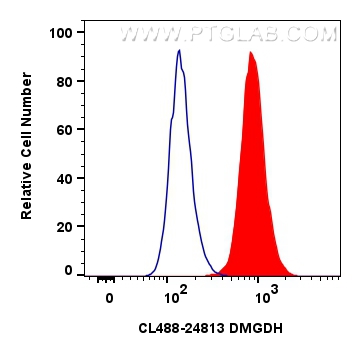CoraLite® Plus 488-conjugated DMGDH Polyclonal antibody
DMGDH Polyclonal Antibody for FC (Intra)
Host / Isotype
Rabbit / IgG
Reactivity
human, mouse, rat
Applications
FC (Intra)
Conjugate
CoraLite® Plus 488 Fluorescent Dye
Cat no : CL488-24813
Synonyms
Validation Data Gallery
Tested Applications
| Positive FC (Intra) detected in | HepG2 cells |
Recommended dilution
| Application | Dilution |
|---|---|
| Flow Cytometry (FC) (INTRA) | FC (INTRA) : 0.80 ug per 10^6 cells in a 100 µl suspension |
| It is recommended that this reagent should be titrated in each testing system to obtain optimal results. | |
| Sample-dependent, Check data in validation data gallery. | |
Product Information
CL488-24813 targets DMGDH in FC (Intra) applications and shows reactivity with human, mouse, rat samples.
| Tested Reactivity | human, mouse, rat |
| Host / Isotype | Rabbit / IgG |
| Class | Polyclonal |
| Type | Antibody |
| Immunogen | DMGDH fusion protein Ag20529 |
| Full Name | dimethylglycine dehydrogenase |
| Calculated Molecular Weight | 866 aa, 97 kDa |
| Observed Molecular Weight | 97 kDa |
| GenBank Accession Number | BC022388 |
| Gene Symbol | DMGDH |
| Gene ID (NCBI) | 29958 |
| Conjugate | CoraLite® Plus 488 Fluorescent Dye |
| Excitation/Emission Maxima Wavelengths | 493 nm / 522 nm |
| Form | Liquid |
| Purification Method | Antigen affinity purification |
| Storage Buffer | PBS with 50% Glycerol, 0.05% Proclin300, 0.5% BSA, pH 7.3. |
| Storage Conditions | Store at -20°C. Avoid exposure to light. Stable for one year after shipment. Aliquoting is unnecessary for -20oC storage. |
Background Information
DMGDH(Dimethylglycine dehydrogenase, mitochondrial) is also named as ME2GLYDH and belongs to the GcvT family. It catalyzes the oxidative demethylation of dimethylglycine to form sarcosine and it plays a role in choline catabolism in the liver. The full length protein has a transit peptide.
Protocols
| Product Specific Protocols | |
|---|---|
| FC protocol for CL Plus 488 DMGDH antibody CL488-24813 | Download protocol |
| Standard Protocols | |
|---|---|
| Click here to view our Standard Protocols |


